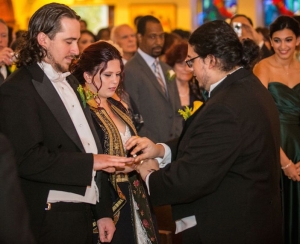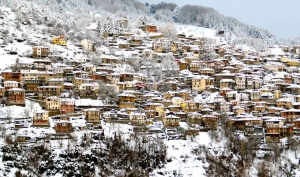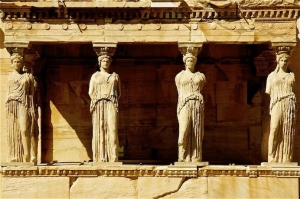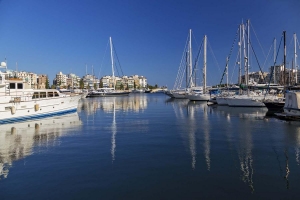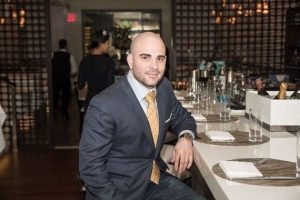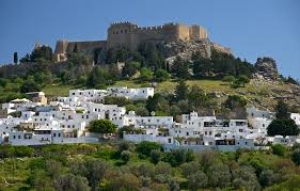BUSINESS CENTRE
XpatAthens
Tuesday, 15 December 2015 07:00
Remarkable Story Of One Bride's Wish To Honor 5 Generations Of Greek Women With Century-Old Wedding Coat
A great grand-daughter born in New York and a great-grandmother born a world and four generations back in Turkey - connected by a wedding coat. This is the beautiful story of Evangelia Tsaoussis and her desire to pay tribute to four generations of her family's Greek heritage.
Ever since Evangelia (Eva) first laid eyes on her Yiayia Eliso's wedding coat, she felt a connectiont to it. Yiayia Eliso was her great-grandmother, her 'little yiayia' who was both as tall and as tiny as Eva was. And although they were born a world apart and in different eras, more than a century apart - growing up little Eva felt a special bond with her great grandmother.
Both were born with the same attitude and thirst for life as the other, that same underlying love of family and fierce survivor attitude. Eva and her great-grandmother were very close, Yiayia Eliso passed away at the age of almost 100, leave Eva with a full lifetime of memories.
Yiayia Eliso was born Elizabeth Bantos in the early 1900s in the historic Phanar district of then Constantinople to parents who fled from Pontos and walked for days to reach safety. It was the time in the late 1800s and early 1900s when life for Greeks in Asia Minor was volatile and dangerous.
Yiayia Eliso’s mother Vasiliki was given a traditional Greek wedding coat by her mother, taking the story of this embroidered jacket back five generations. With the help of a Turkish Imam in Constantinople, Eliso’s family was helped with safe passage to Epirus in mainland Greece, where they stayed for a few years, before heading to Athens, where the family settled.
All along the way, the wedding coat that was with the family for generations was amongst the most precious cargo when the family resettled from one place to another. Eva’s family tree is the stuff legends are made of— having survived the massacres and genocide of the Greeks of Pontos, migration from Constantinople to mainland Greece, both world wars, the occupation, the civil war and subsequent expulsion from their homeland, eventually arriving in America as refugees, where Eva’s mother Liz (named after yiayia Eliso), was born.
Liz grew up in New York’s close-knit Greek American community. She eventually married and had two children— Eva, and a son George. She instilled in both of her children a love of faith, culture and community service and always shared stories of her rich family history and heritage. So when Eva matured and it was time for her to get married— it was only natural that she honor her family— and the memory of her great grandmother with whom she shared so much— by donning the family wedding coat.
To read more, please visit: Pappas Post
Published in
People
Tagged under
Monday, 11 December 2017 07:00
What To Do In Greece During The Christmas Holidays
What to do in Greece during the Christmas holidays!? Fortunately, Greece is a terrific place to be at anytime during the year and especially during the Christmas holidays.
Hopefully you have a few days to experience some of the great ideas that we've suggested for you below. All of these ideas are great for the whole family, with friends or if you're traveling solo.
Find A Great Bakery Or Drop In At A Friend's House
Christmas in Greece brings many traditions from different parts of the country, but one tradition that is the same everywhere is all the great desserts! Visit a Greek friend's house during the holidays or a local bakery to try some of these traditional Christmas flavours:
Melomakarona - traditional Christmas cookies with delicious Greek honey.
Kourabiedes - traditional Christmas cookies covered in white powedered icing sugar.
Orange Cake - oranges are in season during the winter in Greece and many traditional recipes call for orange.
Diples - thinly folded pastry drizzled lightly with yummy Greek honey.
Vasilopita - traditional sweet bread baked for new years day.
Hopefully you have a few days to experience some of the great ideas that we've suggested for you below. All of these ideas are great for the whole family, with friends or if you're traveling solo.
Find A Great Bakery Or Drop In At A Friend's House
Christmas in Greece brings many traditions from different parts of the country, but one tradition that is the same everywhere is all the great desserts! Visit a Greek friend's house during the holidays or a local bakery to try some of these traditional Christmas flavours:
Melomakarona - traditional Christmas cookies with delicious Greek honey.
Kourabiedes - traditional Christmas cookies covered in white powedered icing sugar.
Orange Cake - oranges are in season during the winter in Greece and many traditional recipes call for orange.
Diples - thinly folded pastry drizzled lightly with yummy Greek honey.
Vasilopita - traditional sweet bread baked for new years day.
Head To Kaimaktsalan & The Pozar Thermal Springs
This is a terrific combination for skiing and swimming! One day you can go skiing on the mountain of Voras (Kaimaktsalan), stay in the village of Old Agios Athanassios, and the next day (or even the same day) you can visit the Thermal Springs of Pozar. If you're feeling adventurous, you can even hike along the river at Pozar too.
The ski center at Kaimaktsalan is very big, well organized and fun for the whole family. You may also want to rent a snow-bike and ride to the top where an ice church covered with snow stands. This church was constructed by soldiers - entirely build from war material, even bomb shells and barbwire.
Feeling a bit sore? Within 1 hour (or 1.5hrs if foggy) you can soak your body in the hot healing waters of Pozar (with temperatures nearing zero degrees). Feeling a bit risky? Try the hot/cold combination. Next to the thermal poll, there's a freezing waterfall that pours its waters over you. The benefits for the body are superb.
Visit The Waterfalls Of Edessa
As you leave Kaimaktsalan, do not forget to pass through the city of Edessa. There you will find the waterfalls located inside the city and it's a magnificent spectacle. You can even cross the narrow path that goes behind the waterfall - a great photo opportunity. Try walking to the waterfall base, then look up!
Explore The Dream City Of Drama
Drama is a city within a city and is a dream for adults and children alike. The city comes alive at this time of year with many traditional festivities from December to January. In addition to the whole city being decorated for the season, there are many cultural events and programs to enjoy for the whole family. Drama is close to many other great towns and villages to discover in norther Greece, so make sure that you book a couple days to make the most of discovering the area.
To read this article in full, please visit: A Greek Adventure
Published in
Travel Greece
Tagged under
Monday, 14 December 2015 07:00
Greek Government Changes Course On Parthenon Marbles
Greece is no longer mulling court action to win back the Parthenon Marbles from the British Museum in London, Culture Minister Aristides Baltas said Tuesday, adding that the government would kick-start a diplomatic campaign to repatriate the 5th century BC statues.
Questioned by MPs during a session of Parliament’s education committee, Baltas said that the government was unwilling to put forward a legal claim “most importantly because we risk losing the case.”
The committee met to discuss a European Council directive on the return of cultural objects unlawfully removed from the territory of a memberstate.
The leftist minister said that lawyer Amal Clooney and the Doughty Street Chambers legal team from London, who had been advising Athens on possible action in the international court to force the British Museum to hand over the Marbles, had already been compensated for their services.
To read more, please visit: ekathimerini
Published in
Local News
Tagged under
Monday, 14 December 2015 07:00
East Med Yacht Show 2016 To Spotlight Piraeus
The Marina Zea in Piraeus is getting ready to hold the 15th East Med Yacht Show in 2016 and welcome international charter professionals, private yacht brokers and travel agents to give a broad display of over 60 Greek luxury crewed yachts for charter.
After being held for many years in the docks of Poros Island, the event was decided to be held between May 13 and May 18, 2016, in the Marina Zea in the port city Piraeus, one of the largest ports in the world.
In a press conference, Piraeus Mayor Yiannis Moralis underlined the importance of the yacht show for the city's exposure.
“Industry professionals, travel agents, residents and the thousands of visitors that will visit the yacht show will have the opportunity to get to know the attractions and beauties of Piraeus”, Mayor Moralis said and added that the yacht show’s location — Marina Zea — is one of the most impressive spots in Piraeus.
The Municipality of Piraeus will support the yacht show through its ongoing tourism campaign “Destination Piraeus”. All participants and guests at the show will have the chance to get to know the city through the campaign’s apps for smartphone and tablets that support a number of languages.
“Industry professionals, travel agents, residents and the thousands of visitors that will visit the yacht show will have the opportunity to get to know the attractions and beauties of Piraeus”, Mayor Moralis said and added that the yacht show’s location — Marina Zea — is one of the most impressive spots in Piraeus.
The Municipality of Piraeus will support the yacht show through its ongoing tourism campaign “Destination Piraeus”. All participants and guests at the show will have the chance to get to know the city through the campaign’s apps for smartphone and tablets that support a number of languages.
To read more, please visit: Greek Travel Pages
Published in
Greece In The News
Tagged under
Friday, 11 December 2015 07:00
Supporting Children In Greece Suffering From Cancer
One Monday in late November 2015, a big charity event took place in Manhattan, New York. Spiros Menegatos, a young Greek-American entrepreneur and owner of the famous Nerai Restaurant undertook an initiative to support children suffering from cancer in Greece. His selfless effort employed a unique approach. He brought together people from different social and economic backgrounds to combine forces around one single goal; to build awareness that as Greece plummers deeper into the stagnant waters of recession and misery and public sector funds dry up, the people must step in to provide aid to social groups that require it.
Although he has created great success in the U.S, Spiros Menegatos never forgot his motherland, Greece. His decision to open a Greek restaurant in Manhatten was just the first step he made towards remaining connected with the modern culture of Greece. But that, for him, was not enough.
To read more, please visit: Huffington Post
Published in
People
Tagged under
Thursday, 10 December 2015 07:00
OECD: Greece Among The 'Smartest" Countries In The World
Some good reportage about Greece for a change!
The OECDreleased a list that ranks countries based on the highest number of scientists per capita in fields such as mathematics, physics, technology and engineering. As it turns out Greece was placed among the 10 “smartest” countries in the world.
The first place was occupied by South Korea with 32% of students in the country studying in a scientific field, according to data from 2012. The country showed a significant drop in numbers since 2002 when percentage was 39%.
Germany came second with 31% and Sweden placed third with 28%. Sweden also placed second, after Norway, in regards to the widespread use of computers in the workplace. Finland came fourth with 28% as well, while according to the OECD most students in the country specialize in the research and production of medicine.
To read more, please visit: Greek Reporter
by
Ioanna Zikakou
Published in
Greece In The News
Tagged under
Wednesday, 09 December 2015 07:00
Underwater Weddings Coming To Greek Island
Authorities at the Greek island of Alonnisos have made some innovative decisions in order to increase the tourism rate on the island in the coming summer season. The actions they have prepared focus on diving and hiking tourism, as well as on original events, such as underwater weddings.
Their main goal is to expand the touristic season on the island through alternative actions and proposals, which are inherent in the flora, the fauna and the natural beauty of the island and to highlight the regions advantages.
Alonissos’ touristic promotion program was created in cooperation with the tourism consultant of the municipality, MTC Group. The program will explore pioneering low-cost methods to attract tourists to the island.
To read more, please visit: Greek Reporter
by
Ioanna Zikakou
To read more, please visit: Greek Reporter
by
Ioanna Zikakou
Published in
Local News
Tagged under
Monday, 16 December 2024 07:00
From Saint Nicholas To Santa Claus & The Tradition Of Giving Gifts
The story says that Saint Nicholas was born on March 15, 270 AD and died on December 6, 343 AD. He lost both of his parents as a young man and reportedly used his inheritance to help the poor and sick. A devout Christian, he later became a famous 4th-century Greek Bishop of Myra, which was in Asia Minor (modern-day Demre, Turkey). Because of the many miracles attributed to him, he is also known as Nikolaos the Wonderworker. He had a reputation for secret gift-giving, such as putting coins in the shoes of those who left them out for him.
How Saint Nicholas Is celebrated In Greece
According to Christmas traditions in Greece, the patron saint of the holiday is Saint Nicholas, who is also the protector of sailors. For this reason, you will often see boats decorated with many sparkling lights, rather than the traditional Christmas trees. The Christmas season in Greece begins on December 6th, which is Saint Nicholas Day and ends on January 6th with the Feast of the Epiphany (Theophania). The Greek Navy pays tribute to the patron saint of sailors with a special ceremony at the Hellenic Naval Academy.
How Saint Nicholas Is celebrated In Greece
According to Christmas traditions in Greece, the patron saint of the holiday is Saint Nicholas, who is also the protector of sailors. For this reason, you will often see boats decorated with many sparkling lights, rather than the traditional Christmas trees. The Christmas season in Greece begins on December 6th, which is Saint Nicholas Day and ends on January 6th with the Feast of the Epiphany (Theophania). The Greek Navy pays tribute to the patron saint of sailors with a special ceremony at the Hellenic Naval Academy.
From Saint Nicholas to Santa Claus
Over the years, stories of Saint Nicholas' miracles and work for the poor spread to other parts of the world. He became known as the protector of children as well as sailors and was associated with gift-giving. He was a popular saint in Europe until the Reformation in the 1500s, a religious movement that led to the creation of Protestantism, which turned away from the practice of honoring saints. Saint Nicholas, however, remained an important figure in Holland.
Over the years, stories of Saint Nicholas' miracles and work for the poor spread to other parts of the world. He became known as the protector of children as well as sailors and was associated with gift-giving. He was a popular saint in Europe until the Reformation in the 1500s, a religious movement that led to the creation of Protestantism, which turned away from the practice of honoring saints. Saint Nicholas, however, remained an important figure in Holland.
The Dutch continued to celebrate the feast day of St. Nicholas on December 6 and it was a common practice for children to put out their shoes the night before. In the morning, they would discover the gifts that St. Nicholas had left there for them. It is said that Dutch immigrants brought St. Nicholas, known to them as Sint Nikolaas or by his nickname Sinter Klaas, and his gift-giving ways to America in the 1700s.
In America, St. Nicholas went through several transformations and eventually, Sinter Klaas became Santa Claus and instead of giving gifts on December 6, he became a part of the Christmas holiday. In the 1820 poem "An Account of a Visit from St. Nicholas" by Clement Clarke Moore, he is described as a jolly, heavy man who comes down the chimney to leave presents for deserving children and drives a sleigh pulled by flying reindeer. The cartoonist Thomas Nast added to the St. Nicholas legend with an 1881 drawing of Santa as wearing a red suit with white fur trim. Once a kind, charitable bishop, St. Nicholas had become the Santa Claus we know today.
Published in
Greek Traditions
Tagged under
Monday, 15 December 2025 07:00
Melomakarona - Greek Christmas Cookie Recipe
It's Christmas time! Melomakarona (Greek honey cookies) are one of the most popular treats throughout Greece during the Christmas holidays, and their intense homely smell makes every house smell like Christmas. These sweet little Greek honey cookies (melomakarona) are quick to bake, so much fun to make, and highly addictive to eat. Consider yourself warned.
This easy-to-follow traditional Greek melomakarona recipe makes 60 delicious festive cookies, plenty for everyone to try. Serve with a hot cup of coffee, and you have a match made in heaven! Let the smell of freshly baked cookies, orange, and cinnamon remind you it’s Christmas. Enjoy!
Serves: 50 Cookies
Difficulty: Intermediate
Difficulty: Intermediate
Prep Time: 30 minutes
Cooks in: 20 minutes
Cooks in: 20 minutes
Ingredients for the Melomakarona
• 150g thin semolina (5.3 ounces)
• 500g flour (soft) (17.6 ounces)
• 1/2 tbsp baking powder
• 100g orange juice (3.5 ounces)
• 3 tbsps cognac
• 100g sugar (3.5 ounces)
• 1 flat tbsp powdered cinnamon
• 1/3 tsp nutmeg (powder)
• 1/3 tsp clove (powder)
• 1 tsp vanilla extract
• 1/2 tbsp baking soda
• 90g water (3.2 ounces)
• 125g olive oil (4.4 ounces)
• 125g vegetable oil (4.4 ounces)
• 50g honey (1.8 ounces)
• zest of 1 orange
Ingredients for the Syrup
• 500g water (2 cups)
• 1 kg sugar (35.27 ounces)
• 150g glucose (5.3 ounces)
• 1 cinnamon stick
• some orange peel
• 500g honey (17.64 ounces)
For the Garnish
• 200g chopped walnuts (7 ounces)
• powdered cinnamon (optional)
• powdered clove (optional)
To see the full recipe and preparation instructions, please visit: My Greek Dish
Published in
Greek Food & Diet
Tagged under
Monday, 07 December 2015 07:00
Rhodes Vies For European Cultural Capital 2021
Rhodes is officially in the running for the title of European Cultural Capital 2021, after municipal authorities submitted the Dodecanese island’s bid.
Rhodes Mayor Fotis Chatzidiakos described the bid as a “journey that has just set off from its first port”.
“This is the result of painstaking work done over many months… Rhodes aims to establish itself as an influential destination historically, one of intellectual development in the sciences and the arts, and as a center of dissemination of European ideals,” the mayor added.
“At the moment, the world is observing Greece and Europe as a whole struggling with massive issues: immigration, refugees, religious dogmatism and extremism, conflicts and economies of different speeds. It is vital that Europe regain its credibility as a strong economic center and one of compassion,” Mr Chatzidiakos said.
To read more, please visit: Greek Travel Pages
Published in
Greece In The News
Tagged under


